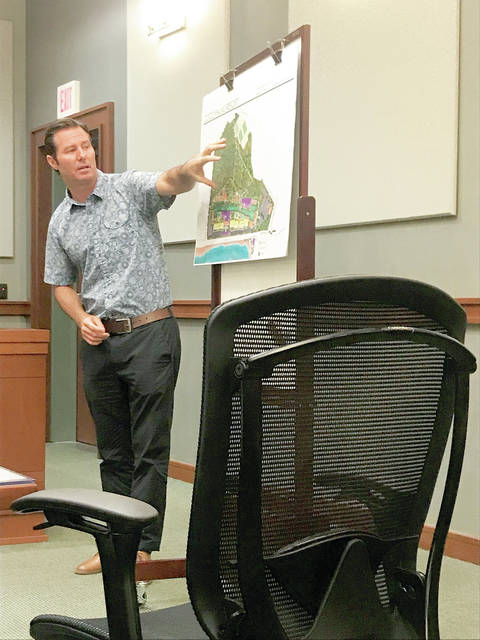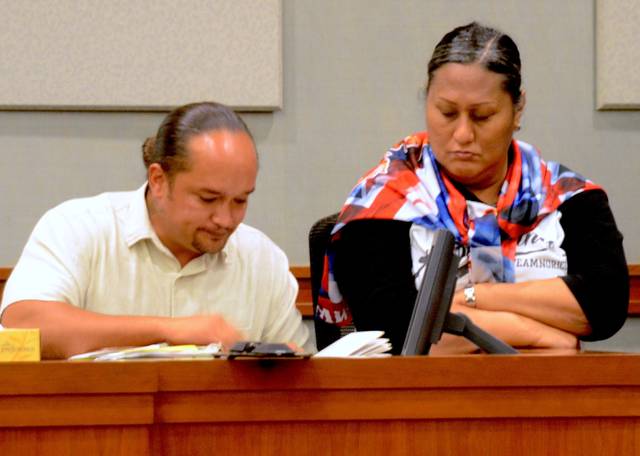LIHUE — Thursday’s continuance in the Coco Palms civil case was continued again to this morning because Hawaiian language interpreter Kumu Hina wasn’t present.
“We received information this morning that Ms. Kalu-Wong is not available today. She indicated that she was available at our last hearing,” Judge Michael Soong said.
His staff confirmed her availability for today.
Attorney for the plaintiffs, Wayne Nasser, asked if there was a possibility in finding an alternate interpreter because they have to travel from Oahu.
“I understand that,” Soong said. “We have a difficult time finding Hawaiian interpreters. We have one on island, but he does only Niihau Island.”
Nasser then asked if they could proceed without an interpreter. Soong asked defendant Kamu Hepa if he wanted his interpreter present. Hepa objected.
Soong apologized, saying this was something that was beyond the court’s control.
“We expected to resume today and possibly conclude today, but it will have to be continued to 8:30 a.m. tomorrow,” he said.
The Trial
For over a month Soong has presided over a civil case filed in district court by developers Chad Waters and Tyler Greene of Coco Palms Hui LLC, against defendants Noa Mau-Espirito and Kamu Hepa, whom for nearly a year have occupied a portion of the contested land, prohibiting development.
Coco Palms Hui LLC purchased the land through a title agreement from an insurance company, while Mau-Espirito and Hepa claim the land through ancestry and royal patent.
The case being heard could result in the ejection of the defendants from the property, which could result in the continued development of the new Coco Palms Hotel.
If Soong rules in favor of the defendants, they said they would likely develop the land into a cultural and religious center for the Kanaka Lahui Nation, that would include a school an elder’s home and a farm.
The trial began with Soong ruling against a motion of dismissal filed with the court by the defendants on Nov. 9.
Dismissal, the defendants argued, was based on the courts lack of jurisdiction over the matter at hand, which is who is rightfully entitled to possess the land. The trial, Soong said, is not to determine title.
“District Court doesn’t have any jurisdiction on an action that involves Title II real estate and if there’s a question of title, that would lie with Circuit Court,” Soong said.
Testifying on behalf of Coco Palms Hui LLC, Greene has maintained that the LLC is the rightful owners of the property. He told the court of their warranty deed to the property, when they purchased the property and of their plans to develop the property. Those plans, Greene said, have been deterred due to those who are occupying the land.
“The goal has always been bring back Coco Palms,” Greene said.
Greene told the court his company has attempted to work with the defendants, offering them a position on the board of the planned cultural center that will be built along with the hotel, but Mau-Espirito and Hepa declined.
Representing themselves in court, Mau-Espirito and Hepa have maintained that they are the rightful owners of the land through ancestry.
Mau-Espirito says he is an heir from the Kamehameha bloodline, while Hepa says he is an heir of Queen Deborah Kapule and Simeon Kaiu.
The defendants claim the title search used by Coco Palms Hui to purchase the land contains errors.
“The title ownership is fictitious, because my cousin (Hepa), sitting right there, (pointing to Hepa), is the heir to Queen Deborah Kapule and the rightful owner of the land,” Mau-Espirito said.
As native tenants, the defendants have claimed through a Supreme Court ruling, they cannot be ejected from the land because they are using it for religious and cultural purposes. Mau-Espirito has also cited the United Nations Genocide Convention 260 from 1948, claiming many of the activities being done to him are considered a war crime.
Hepa’s testimony is expected to continue in court today, with Soong saying the trial could possibly conclude.
One piece of property, two ideas for development
In Wailua, Hepa says he wants to develop the 17-acre parcel of land into a cultural center for the Kanaka Maoli-Lihue Nation.
There’s much to be done, but the fledgling farm has banana trees, pineapple plants, passion fruit plants, three kinds of taro and medicinal plants.
Eventually, he said, they’ll build homes in Wailua to house those in need.
He said they’re planning on building a culturally relevant school for the children and a home for the elderly.
The home, he said, will have a place for kupuna women to continue making traditional arts and crafts.
The land, he said, is for his people and that’s why he’s fighting so hard to keep it from being developed.
Damaged by Hurricane Iniki in 1992, the famed resort lay in waste for 20 years, with no one claiming ownership rights during public hearings about the matter, though several developers have previously attempted to reconstruct the hotel throughout the years, but to no avail.
Since 2012, Waters and Greene, have been trying to develop the property, with the $3.5 million selective demolition process that began in June, with initial plans to begin phase II of the renovation and reconstruction, scheduled for early spring.
The $175 million project will boast about 400 rooms, 12,000 square feet of retail space, three restaurants, leisure areas and a four-acre cultural center.



